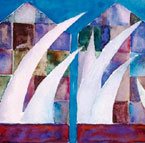Οι φετινές εκδηλώσεις της «Ευρωπαϊκής Ημέρας Γλωσσών 2010» πραγματοποιήθηκαν στη Βαρσοβία από τις 20 έως τις 27 Σεπτεμβρίου.
 Το Γραφείο Τύπου, για μία ακόμη χρονιά, συμμετείχε στη διοργάνωση των εκδηλώσεων προβολής των ευρωπαϊκών γλωσσών, εκδηλώσεις που στοχεύουν στην ενημέρωση του πολωνικού κοινού για τον γλωσσικό και πολιτιστικό πλούτο των χωρών της Ευρώπης. Η Ευρωπαϊκή Ημέρα Γλωσσών θεσπίστηκε από το Συμβούλιο της Ευρώπης το 2001.
Το Γραφείο Τύπου, για μία ακόμη χρονιά, συμμετείχε στη διοργάνωση των εκδηλώσεων προβολής των ευρωπαϊκών γλωσσών, εκδηλώσεις που στοχεύουν στην ενημέρωση του πολωνικού κοινού για τον γλωσσικό και πολιτιστικό πλούτο των χωρών της Ευρώπης. Η Ευρωπαϊκή Ημέρα Γλωσσών θεσπίστηκε από το Συμβούλιο της Ευρώπης το 2001.
Διοργανωτές των εκδηλώσεων ήταν δεκατρείς χώρες, μέλη του EUNIC Cluster Βαρσοβίας (European Union National Institutes for Culture): Ελλάδα (Γραφείο Τύπου Ελληνικής Πρεσβείας), Εσθονία (Πρεσβεία Εσθονίας), Ιρλανδία (Πρεσβεία Ιρλανδίας), Μεγ. Βρετανία (British Council), Βέλγιο (Πρεσβεία Βελγίου), Δανία (Πολιτιστικό Ινστιτούτο Δανίας), Γερμανία (Goethe-Institut), Πορτογαλία (Ινστιτούτο Camoes), Γαλλία (Γαλλικό Ινστιτούτο), Ιταλία (Ιταλικό Ινστιτούτο), Αυστρία (Αυστριακό Ινστιτούτο), Ρουμανία (Ρουμανικό Ινστιτούτο), Ρωσία (Ρωσικό Κέντρο Επιστήμης και Πολιτισμού).
Στη διοργάνωση συμμετείχαν, επίσης, το EUNIC Cluster Βαρσοβίας, η Αντιπροσωπεία της Ευρωπαϊκής Επιτροπής στην Πολωνία, το πολωνικό Ίδρυμα για την Ανάπτυξη του Εκπαιδευτικού Συστήματος, το Πανεπιστήμιο Βαρσοβίας, το Εκπαιδευτικό Τμήμα του Δήμου Βαρσοβίας, το Κρατικό Εθνογραφικό Μουσείο στη Βαρσοβία, η Δημόσια Βιβλιοθήκη της συνοικίας Praga (Δήμος Βαρσοβίας), το πολωνικό Κέντρο για την Ανάπτυξη της Εκπαίδευσης, η πολωνική Κρατική Επιτροπή για την Πιστοποίηση της Επάρκειας της Πολωνικής ως Ξένης Γλώσσας. Οι εκδηλώσεις τελούσαν υπό την αιγίδα του πολωνικού Υπουργείου Εθνικής Παιδείας, του πολωνικού Υπουργείου Επιστήμης και Ανώτερης Εκπαίδευσης, της Δημάρχου Βαρσοβίας και της Πρυτάνεως του Πανεπιστημίου Βαρσοβίας.
Η απήχηση των εκδηλώσεων τις προηγούμενες χρονιές οδήγησε τους διοργανωτές στην απόφαση για την φετινή διοργάνωση πολυήμερων εκδηλώσεων, με ποικίλο περιεχόμενο.
Το πλήρες πρόγραμμα, που περιελάμβανε, μεταξύ άλλων, ημερίδα, μαθήματα γλωσσών, σεμινάρια, φεστιβάλ ταινιών, street game, κ.ά., μπορεί να αναζητηθεί στην ηλεκτρονική σελίδα των εκδηλώσεων www.edj.waw.pl

Przemek Kordos, Maria Mondelou, Pantelis Gianoulis at the Greek stand
Η ελληνική συμμετοχή στις εκδηλώσεις, η οποία περιελάμβανε μεταξύ άλλων φεστιβάλ ταινιών, μάθημα ελληνικής γλώσσας, σεμινάριο για το ζεϊμπέκικο, ελληνικό περίπτερο κ.ά., διοργανώθηκε από τη Γραμματέα Επικοινωνίας, Μαρία Μονδέλου.
Αναλυτικότερα, η ελληνική συμμετοχή είχε ως εξής: Continue reading →
Filed under: Art, Book, Cinema, culture, Education, European Union, Greece, Greeks Abroad, history, International Relations, Literature, Music, Nature, News in Greek, Photo, Poland, tourism | Tagged: 20, 2007, 2010, 27, Acropolis, Ambassadors, Attache, audio-visual, Austria, Award, books, Borowska, Boulmetis, Britain, British, Cacoyannis, Camoes, Centre, Chalasinska, Chipita, Cluster, Commission, Communication, Conference, contact, Council, countries, cultural, culture, Current Affairs, Dance, Day, demo-lesson, demo-lessons, director, directors, DVD, Elzbieta, Embassy, Ethnografical, Etnokino, EUNIC, Europe, European, events, festival, Film, films, for, foreign, France, game, General, Germany, Goethe-Institut, Greece, Greek, greeting, groups, Ifigenia, in, inauguration, Information, Institute, Institutes, Integrate, Interdisciplinary, Istituto, Italy, πρόγραμμα, πρέσβεις, προσέλευση, προβολές, προβολή, παράλληλες, παραστάσεις, παραγωγοί, παιχνίδια, περίπτερο, περιεχόμενο, πλήθος, πλούτος, πολυήμερες, πολωνικό, πολωνικά, πολωνικές, πολιτιστικό, πολιτιστικός, πολιτισμός, στην, συγκροτήματα, σχολεία, σεμινάρια, σκηνοθέτες, ταινίες, τελετή, της, το, τουριστικό, υλικό, φυλλάδια, φεστιβάλ, φετινές, φορείς, φοιτήτριες, φοιτητές, χώρα, χώρες, χάρτες, χαιρετισμός, χορευτικά, χορηγός, ψυχαγωγικές, Έδρα, Ίδρυμα, Αυστρία, Αθήνα, Ακρόπολης, Αντιπροσωπεία, Ανατολικών, Βρετανία, Βέλγιο, Βαρσοβία, Βαρσοβίας, Βλάσης, Γραφείο, Γραφείου, Γραμματέας, Γραμματεία, Γαλλία, Γερμανία, Γενική, Γιαννούλης, Γλωσσών, Γλώσσας, Δανία, Διεπιστημονικών, Διεθνές, Επιτροπή, Επιτροπής, Επικοινωνίας, Εσθονία, Ευρωπαϊκών, Ευρωπαϊκής, Ευρώπη, Ευρώπης, ΕΟΤ, Εθνικής, Εθνογραφικό, Ελλάδα, Ελληνικό, Ελληνικός, Ελληνικών, Ελληνική, Ελληνικής, Ενημέρωσης, Ημερίδα, Ιρλανδία, Ιταλία, Ιφιγένεια, Ινστιτούτα, Ινστιτούτο, Κέντρο, Κακογιάννης, Μπουλμέτης, Μήκους, Μαρία, Μαθήματα, Μιχάλης, Μικρού, Μουσείο, Μοντεμάρκος, Μονδέλος, Μονδέλου, Ντολυμαντέρ, Νομαρχιακή, Ξένων, Οι, Πρύτανης, Πρεσβείας, Προβολής, Παιδείας, Παλαιά, Παντελής, Πανεπιστήμιο, Πορτογαλία, Πολωνία, Πολίτικη, Ρωσία, Ρωσικό, Ρέθυμνο, Ρεθύμνης, Ρουμανία, Σπουδών, Στέφανος, Συμβούλιο, Συμμετοχή, Σχολή, Σβορώνου, Σεπτεμβρίου, Σεμινάριο, Τύπου, Τάσος, Ταινιών, Τουριστικής, Υπουργείο, απήχηση, αρχές, αφιέρωμα, αναπηρία, βιβλιοθήκη, για, γλωσσικός, γλώσσα, γλώσσες, δρόμου, δήμαρχος, δεξίωση, διευθυντές, διοργάνωση, διοργανωτές, επαφή, επισκέπτες, ευρωπαϊκές, ευρωπαϊκή, εβδομάδα, ειδικό, εκπαίδευσης, εκδηλώσεις, εκμάθηση, ελληνικές, ενώνουν, ενημέρωση, εορτασμός, ζεϊμπέκικο, ημέρα, ιστοσελίδα, ιδρύματα, και, κινηματογράφος, κινηματογραφικό, κουζίνα, κοινό, λευκώματα, λειτουργία, μάθημα, μέσης, μέλη, μας, μαθητές, μεγάλου, μορφωτικά, μουσικά, νέο, νησιά, οπτικοακουστικό, Katarzyna, Kazimierzowski, Kordos, language, Languages, library, Macukow, Malgorzata, maps, Maria, masterpiece, material, Michael, Mondelos, Mondelou, Museum, Music, My, national, New, News in Greek, no, of, Office, old, on, On-Line, Organisation, organisers, Organization, Part I, Participation, Poland, Poles, Polish, Portugal, Press, Programme, promotion, Przemek, public, Rafał, Reality, reception, rector, Representation, Rethymnon, RONIK, Rudnicki, Russia, Russian, School, schools, Secretariat, September, site, Sound, Spice, sponsor, Sroka, stage, stand, Stefanos, street, Students, studies, Svoronou, Swirska, Tasos, The, Touch, tourism, touristic, Union, University, Warsaw, with, Workshop, workshops, Zeimbekiko | Comments Off on Εκδηλώσεις “Ευρωπαϊκής Ημέρας Γλωσσών” (Βαρσοβία, 20-27/9/2010)- Συμμετοχή Γραφείου Τύπου Βαρσοβίας
 Various events will be open to the public, including screenings of films, such as “Diolkos – for 1.500 years” (25 September, 13.00 p.m, Russian Cultural Institute, RONIK).
Various events will be open to the public, including screenings of films, such as “Diolkos – for 1.500 years” (25 September, 13.00 p.m, Russian Cultural Institute, RONIK). 
































































.jpg)





 The 2010 campaign was unveiled by the Deputy Minister of Tourism Angela Gerekou on March 8, and is based on a redesigned pattern of previous campaigns with the addition of the well-known greeting in the Greek language.
The 2010 campaign was unveiled by the Deputy Minister of Tourism Angela Gerekou on March 8, and is based on a redesigned pattern of previous campaigns with the addition of the well-known greeting in the Greek language. The town of
The town of 
 “
“

.jpg) The
The  (GREEK NEWS AGENDA) The
(GREEK NEWS AGENDA) The 
















